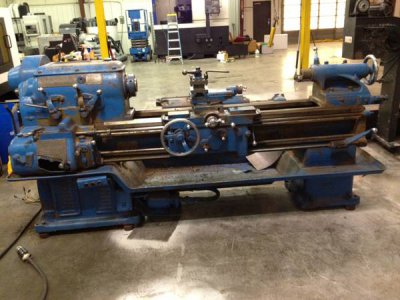The problem with the New vs. Used equipment is that it's like talking about religion or politics. Everyone has their own opinion, and it is the correct one. I'll try to distill what I have learned, buying both used and new equipment, in an objective fashion. This is aimed at the hobbyist, not someone trying to make a living at this.
Entry into service: Hands down, the new machine wins on this one. With few exceptions, you can just move it in, level it and bolt it down, if needed, plug it up and go. I'm talking about a hobby machine here, one that comes single phase. If you don't already have a machine, I certainly recommend this, because if you buy a used lathe as your first lathe, and you find out you need a lathe to fix a part on it, you are now in a catch 22 and will probably have to hire the work done. I have bought a number of used machines, the only one that I purchased that I could start making chips on without at least some work was the Tormach mill, and it was only about 4 years old.
Wear: Obviously, the new machines win this one. While I agree that there are many used machines out there that are good machines, most of the folks on here don't have the knowledge or experience to determine that, and besides, if you are buying something on EBay, it’s a pig in a poke and you wind up with what you get. Sometimes you get lucky, sometimes you don't.
Quality: This is the area where the used industrial USA/Japanese/European machines tend to shine. They were built to a higher quality standard than what you will find in most Chinese import machinery. I purchased a 13x40 HF lathe some years ago, and while I have made a good number of parts on it, there are some things I don’t like. The QC gearbox leaks. The detents on the gear shift knobs are weak and it pops out of gear when you are running it. The Tormach mill is Chinese, but is high quality (with a price to match).
Cost: This can be a bit of a grey area. Used prices are all over the place, and maybe you will get a great deal for a great machine for $1000, and maybe you will get a very clean, well painted and worn out machine for $3000. Its buyer beware on these machines. I have a planer that is 130 years old or so, and at some time, some unscrupulous person had some of the ways planed, then frosted. I haven’t gotten that machine going yet, so I don’t know if it will effect performance or not (likely, if it was well planed, it won’t), but this is the kind of thing that is done.
There are a few other things to take into consideration that fall more under the Industrial vs Hobby category. Probably the main thing is weight. My 13 x 40 probably weighs 1500 lbs or so. Compare that with a Monarch EE, which weighs in at something like 5000 lbs. If your shop is in your basement, or you don’t have the equipment to move or haul those kinds of loads, that pushes you more towards the light duty, hobby equipment that is dominated by the Chinese machines, new or used. There was a comment earlier on quick change gearboxes on lathes. The nice thing about QC gearboxes on lathes is that they can quickly and easily be set up to cut the gears that they are designed to cut. The bad thing about QC gearboxes is that they can ONLY be easily set up to cut the gears that they are designed to cut. If you want to cut something that isn’t on the menu of your QC gearbox, a worm for instance, you will need to fabricate some sort of way to hold change gears, then get said change gears and your back to where you were with a change gear lathe. So it kind of depends on what you are doing and what kind of threads you want to cut. If you are making model engines, I would recommend a change gear lathe. If you don’t plan to make anything that doesn’t require a standard thread that can be done on a QC gearbox that is the way to go. There is a reason they made both, and it wasn’t just cost.
Personally, I like the old machines, but with a half dozen or so in my shop right now that are “in process”, I am leaning more towards unloading some of them and ordering new (at least of the ones that they make replacements for).


